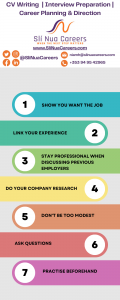- Not letting them know you really want the job. It’s crucial to show a genuine desire for the position during the interview. While it’s important to remain professional, don’t be afraid to express your excitement about the opportunity. You can do this by asking informed questions about the company and the role, and by sharing your own relevant skills and experiences.
- Failing to link your experience to the job at hand. Tailor your responses to the specific job for which you’re interviewing. Make sure to highlight the skills and experiences that are most relevant to the position and give specific examples of when you’ve applied those skills in the past.
 Getting dragged into negative discussions about previous employers. Remain professional and avoid badmouthing previous employers, even if you had a difficult experience. Instead, focus on the positive aspects of your past experiences and how you were able to learn and improve from them.
Getting dragged into negative discussions about previous employers. Remain professional and avoid badmouthing previous employers, even if you had a difficult experience. Instead, focus on the positive aspects of your past experiences and how you were able to learn and improve from them.- Not knowing enough about the company and the job. This is surprisingly common. Do your research and have a basic understanding of the company. This could include learning about their products, services, mission and values. It’s also a good idea to research the specific job you’re applying for, including the responsibilities and requirements. Hit Google and make the calls.
- Being unduly modest. This is not the time to downplay your accomplishments. Speak confidently and positively about your skills and experiences. Highlight your achievements and successes, and explain how they make you a strong candidate for the job. If you don’t speak up for you, who will?
- Failing to ask questions. Show that you’re interested by asking good questions. Asking questions demonstrates that you’ve done your research and have a genuine interest in the position. To improve in this area, prepare a list of thoughtful, relevant questions in advance. These might include questions about the company culture, the day-to-day responsibilities of the role and opportunities for growth and development. By asking these questions, you’ll show you’re eager to learn more about the company and the job.
- Not practising beforehand. Practise common questions with a friend or family member. By going through the procedure of answering questions out loud, you will get a better sense of your own strengths and areas you need to improve upon. It can also help you to come up with specific examples and anecdotes to illustrate your points. Practicing with someone else can also provide valuable feedback, as the other person can offer suggestions for improvement and identify any nervous habits or verbal ticks of which you may have been blissfully unaware. Overall, practicing common interview questions with a friend or family member can greatly enhance your performance during the interview.
Avoid these common job interview errors and you dramatically increase your chances of success. Because job interviews are not something we do all that often, it can be difficult to prepare properly for them. Candidates often live in fear of them. But you owe it to yourself to promote yourself in the best possible way on the day – and good preparation is the best way of ensuring you do just that.
Featured image courtesy of Pixabay.
Need interview training? Go HERE for all types of interview
Need our help? Complete this form below and we will get back to you
[contact-form-7 id=”15430″ title=”Career & Personal Development”]